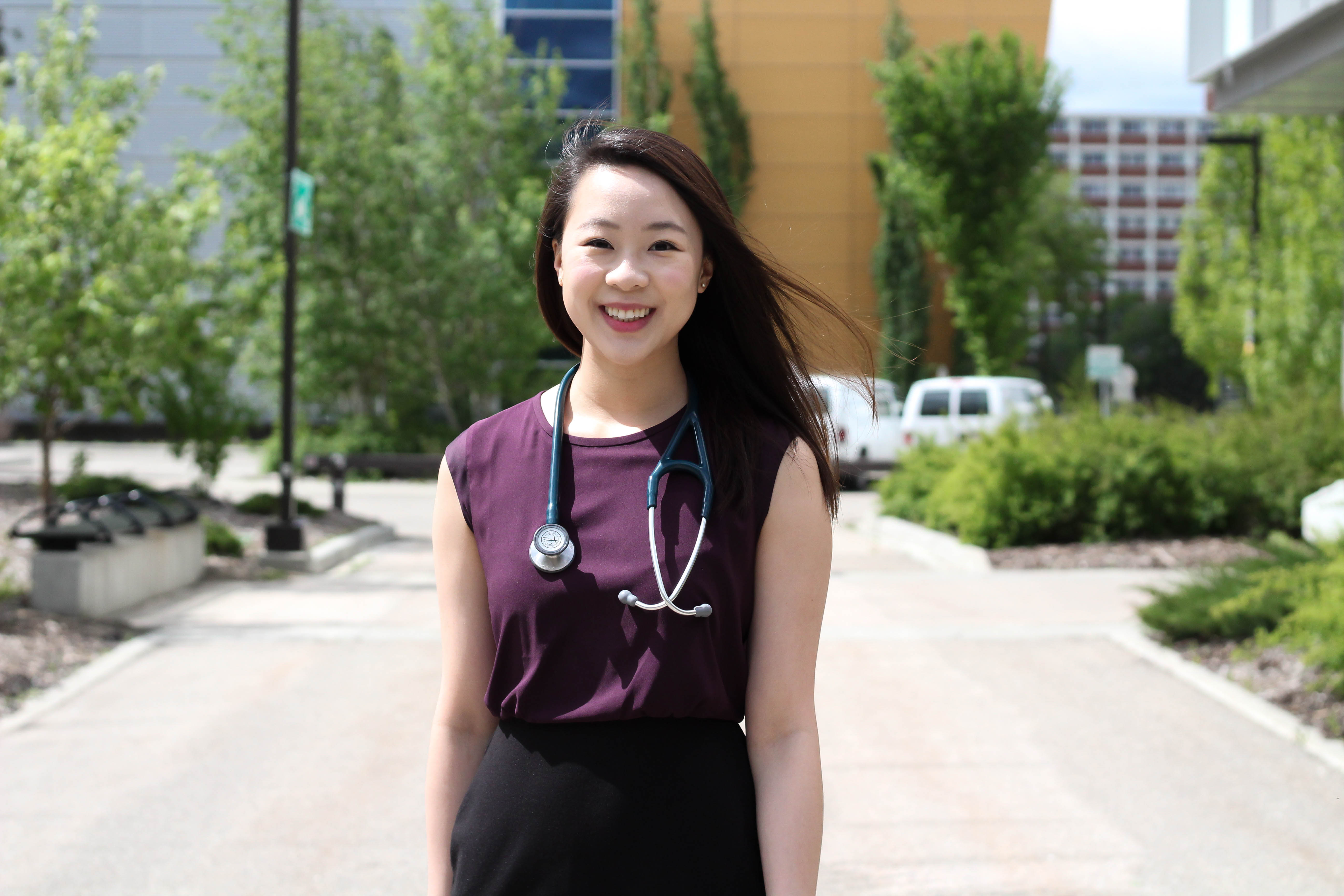
Through accepting and treating her depression, Michelle Huie discovered the kind of doctor she wanted to be. (Photo by Melissa Fabrizio)
Calgarian Michelle Huie started first-year medical school at the University of Alberta like every other student: enthusiastically. She knew that acceptance into the competitive program is a milestone in and of itself.
At first, Huie-who was voted class representative by her peers-appeared outgoing and energetic. But by mid-year, those who knew her well, such as her boyfriend, were very concerned about her.
She insisted she was fine. Huie told herself that concentrating in class wouldn't always feel like running in water. That sleeping and eating would once again be pleasurable activities. That she wouldn't be standing on the street corner, weighed down by her heavy backpack, thinking absent-mindedly, "I could just step out in front of this bus ..."
"I was very sick," she admitted. "I tried to mask it. Nobody else seemed to be struggling. And with medical students, you are with a cluster of people who strive to overcome obstacles and push past things. Everyone is a rock star, so I felt like I couldn't show I was struggling."
Huie's depression affected her marks. When she received the devastating news that if she wanted to be a doctor, she would have to redo her first year-an allowance the faculty makes in rare cases-she realized she needed help.
Huie decided to get counselling from the Office of Advocacy & Wellbeing (formerly the Office of Learner Advocacy and Wellness) in the Faculty of Medicine & Dentistry, established seven years ago to provide support and advocacy to undergraduate and postgraduate learners within the faculty).
"In 2016, we had just over 3,000 visits from undergraduate and postgraduate learners, and about 20 per cent of those visits were counselling appointments," said Jaleh Shahin, the Office of Advocacy and Wellbeing's psychologist.
"Medicine is a demanding program," said Shahin, "and learners generally share a high drive to succeed and are very ambitious. The combination of some common personality traits and a demanding environment can increase the risk for mental health challenges for some learners."
Huie ended up going for counselling all spring and summer, which helped her not only accept her illness, but also slowly begin the process of managing its symptoms. She also took actions to help her recovery, including exploring aspects of herself beyond university life. She joined intramural volleyball and became a mentor to a 12-year-old girl in the Boys and Girls Club. "It was very healing," she said. "I think she inadvertently mentored me as much as I mentored her."
Huie also got involved with a camp that mentored underprivileged high school students and exposed them to medical school. "I didn't realize it at the time, but I was choosing activities that really interested me, and they were all leading me towards my specialty-pediatrics. I discovered how important youth and advocacy work was to me."
A few weeks before Huie returned to first-year orientation for what she jokingly dubs "Year 1.5," she told a few friends about her illness.
"It was surprising how many students said, 'It could have been me.' In the end, I couldn't have felt more supported."
By the end of a year that involved studying hard, counselling sessions and sharing her story in what would prove to be the very empowering first student-led Monologues in Mental Health coffeehouse, Huie was feeling more like herself.
"I remember thinking, 'OK, I'm back.' I saw a bright light at the end of the tunnel."
She entered clerkship, which moved her out of the classroom and into direct interactions with patients. That was when she felt the transformative powers of her personal experience combine with her education, and what kind of doctor she would become.
"A lady came in teary-eyed, confused as to why she never wanted to leave the house. I asked my preceptor if I could have a few minutes to sit down with her and hash it out. In that moment, I realized how my own personal experience changed how I reacted to the situation."
She added, "Being sick is humbling. It makes you realize how it impacts people's lives. Because doctors see illness every day, it's so important for them to remember every illness is unique to every patient. Patients often wait weeks or months to see a doctor, and their encounter impacts their care as much as the procedure or medication. A doctor's empathy and compassion in itself is healing."
For outstanding compassion in care during her clerkship, Huie was awarded the Dr. Tom Ranieri & Dr. Alf Conradi Excellence in Compassionate Care Scholarship.
Today, Huie, '17 MD, is working through her pediatrics residency at the U of A and she's managing her health by clarifying her identity outside of school, eating and exercising well, learning to say no and, perhaps most importantly, opening up to others and sharing her experiences, as often as she's comfortable.
Said Huie, "No one should ever have to go through an illness feeling alone."